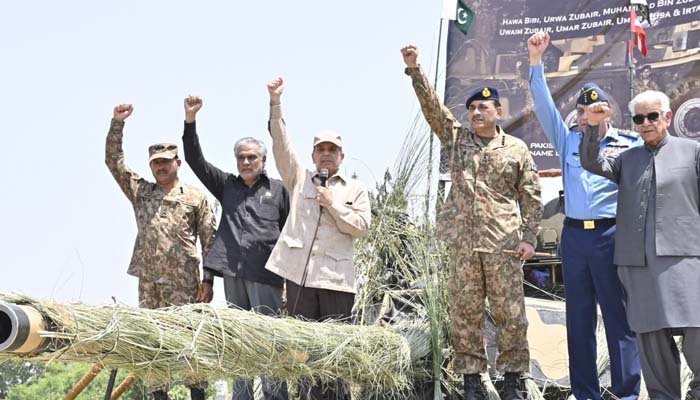Pakistan’s Triumph in Operation Bunyanum Marsoos – A Victory Beyond the Battlefield
By ؛Abid Rasheed
The nation stands united in celebrating the resounding success of Operation Bunyanum Marsoos, where Pakistan’s armed forces erected an unbreakable iron wall against Indian aggression.
The skies roared with the might of the Pakistan Air Force, striking down enemy jets with precision and leaving India’s military ambitions in ruins. The entire country has paid tribute to this valor, marking a Day of Gratitude to honor the sacrifices of its soldiers. Yet, even in this moment of triumph, history whispers a cautionary tale—the Battle of Uhud reminds us that victory can slip away if complacency takes root.
This ceasefire is not peace—it is a pause. India, like a wounded serpent, licks its wounds in silence, its venom undiminished. Our forces remain watchful, as they must, for the threat has not faded.
While the military has fulfilled its duty with unmatched brilliance, the real test now begins for Pakistan’s political, religious, and diplomatic leadership. The world watches closely, and to understand why, we must look back at events that unfolded in the shadows of war.
Just before the operation began, the United States had declared it would stay out of the conflict, calling it a matter between Pakistan and India. Yet, within hours, President Donald Trump intervened, announcing an unexpected ceasefire. This sudden shift was no accident. Two seismic developments forced the West’s hand.
First, China’s military technology stunned the world. When Pakistan’s JF-17 Block II jets, armed with PL-15 missiles, tore through India’s vaunted Rafale fighters, global markets trembled. Shares of China’s AVIC Chengdu Aircraft Corporation—the manufacturer of these jets—surged by 36% in just two days, a clear signal that the era of Western arms dominance was under threat.
Second, India’s reliance on Israeli drones backfired spectacularly. The sight of Israeli-made Harop drones raining down on Pakistani soil ignited fury across the Muslim world, exposing the deepening Hindu-Jewish alliance. Pakistan’s defiance not only shattered India’s pride but also cracked the myth of Israel’s military invincibility.
Fearing that Pakistan’s momentum could redraw the region’s power dynamics, the U.S. rushed to halt the conflict. But the real intrigue unfolded elsewhere—in Geneva, where China and the U.S. held secret trade talks. Within hours, Washington slashed tariffs from 145% to 30%, and Beijing responded by cutting its own from 125% to 10%, dismantling $600 billion in trade barriers. This was no coincidence. Pakistan’s military success had shifted the global chessboard, proving that the nation was no mere pawn but a strategic player in the highest stakes of diplomacy.
Now, as the dust settles, Pakistan faces its next great challenge: economic warfare. India’s financial strength lies in its agricultural exports, particularly to the Middle East. To secure lasting peace, Pakistan must strike at this foundation.
The path forward is clear. Millions of acres of untilled land lie waiting—if cultivated, they could turn Pakistan into a breadbasket for the world. The IMF’s loans must be channeled into farm infrastructure, not swallowed by debt. Landless peasants should be given fields of their own, supported by interest-free loans, while the government ensures their harvests reach global markets through direct exports.
But we must also break India’s stranglehold on trade. In Dubai, Indian middlemen repackage Pakistani rice and Himalayan salt as “Made in India”—a deception that must end. Our traders must bypass these intermediaries, taking their goods straight to the world.
The China-Pakistan Economic Corridor (CPEC) offers another key. With Chinese expertise, Pakistan can revolutionize its agricultural technology, tapping into Central Asia and the Middle East. Meanwhile, our workers—skilled and ready—should be sent abroad in greater numbers, their remittances strengthening the nation’s finances.
None of this will matter, however, without unity. Political squabbles must give way to a shared vision. Rural roads, electricity, and water systems need urgent attention so farmers can thrive. Universities and research centers must nurture a new generation of agriculturists, blending tradition with innovation.
The world is watching. India’s strategies lie exposed, and the balance of power is shifting. Pakistan stands at a crossroads—will we seize this moment to become not just a military power, but an economic and diplomatic force? The answer rests in our hands.
This is not just a victory. It is a call to greatness. Let us rise to meet it.




Comments are closed, but trackbacks and pingbacks are open.